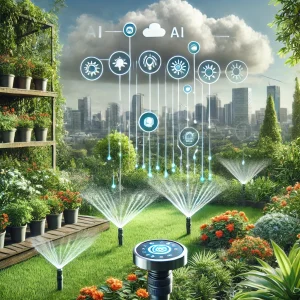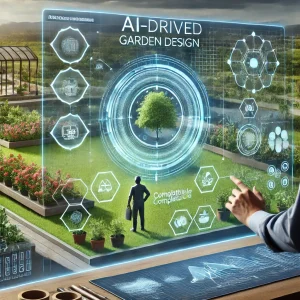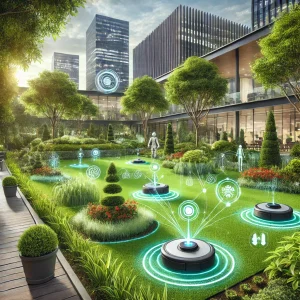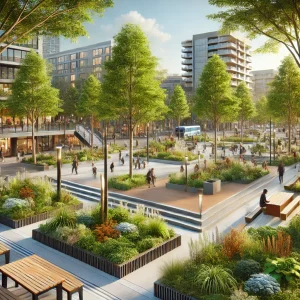As we move into 2025, artificial intelligence (AI) and robotics drive significant transformations in the landscape industry. These technologies are not just changing how we maintain gardens and green spaces; they revolutionize how we design and interact with them. From automated maintenance to intelligent garden design, AI and robotics are set to redefine the future of landscaping for both residential and commercial applications.

Key Advancements in Automated Maintenance
AI and robotics are noticeably impacting automated maintenance in landscaping. For instance, robotic lawnmowers, like those from Husqvarna and Robomow, offer precise, efficient, and eco-friendly lawn care. These machines autonomously mow lawns, navigate obstacles, and adapt to different grass conditions. AI enables these mowers to learn the lawn layout, optimize their routes, and ensure an even cut every time.
AI-powered irrigation systems are also gaining popularity. Companies like Rachio and RainMachine develop systems that monitor weather conditions, soil moisture levels, and plant requirements to deliver the exact amount of water needed. This not only conserves water but also ensures healthier plants by preventing over- or under-watering.

Intelligent Garden Design
AI is making waves in garden design as well. AI-driven software allows landscape architects and homeowners to create highly personalized garden layouts that consider plant compatibility, sunlight exposure, and aesthetic preferences. Platforms like Yardzen and Tilly use AI to provide tailored garden designs that are visually appealing, sustainable, and easy to maintain.
These intelligent design tools simulate how a garden looks and evolves, considering factors like plant growth rates and seasonal changes. This enables more informed decision-making, helping users choose plants and layouts that thrive in their specific environments.

Real-World Examples
IslandEarth Landscape Company in British Columbia leads in integrating AI and robotics into its services. They use robotic mowers for large commercial properties, significantly reducing the time and labor required for maintenance. Additionally, AI-powered irrigation systems save substantial water, aligning with the company’s commitment to sustainable practices.
In Victoria, AI-driven landscape software optimized plant selection and placement for a public park redesign, creating a vibrant, low-maintenance garden that requires minimal intervention. This project demonstrates the potential of these technologies to enhance public spaces.

Future Trends and Predictions
The role of AI and robotics in landscaping will likely expand. More advanced robotic systems are anticipated to handle a broader range of tasks, from weeding to planting and even pest control. AI will likely continue improving garden design software, making it more accessible to everyday users while offering increasingly sophisticated features.
Integrating AI and robotics with sustainable landscaping will also become more prevalent. AI could optimize the use of resources like water and energy, while robotics could assist in creating and maintaining habitats for local wildlife.

Ethical Concerns and Societal Impacts
While the benefits of AI and robotics in landscaping are clear, potential ethical concerns must be addressed. The widespread adoption of these technologies could lead to job displacement in the landscaping industry, particularly for manual laborers. Companies and policymakers must provide retraining opportunities and ensure a responsible transition to automated systems.
Societal impacts, such as the increasing reliance on technology in our everyday lives, also warrant attention. As AI and robotics become more integrated into landscaping, balancing technological innovation and maintaining a connection with nature is important.

AI and robotics will transform the landscape industry in 2025, bringing significant advancements in automated maintenance and intelligent garden design. These technologies offer numerous benefits, from increased efficiency and precision to enhanced sustainability. However, it is essential to navigate the potential challenges and ethical concerns accompanying this transformation. By thoughtfully embracing AI and robotics, we can create beautiful, functional landscapes in harmony with the environment.
As the industry evolves, companies like IslandEarth Landscape in British Columbia lead the way, demonstrating how AI and robotics can be successfully integrated into residential and commercial landscaping. The future of landscaping is undoubtedly bright, with technology paving the way for smarter, more sustainable outdoor spaces.